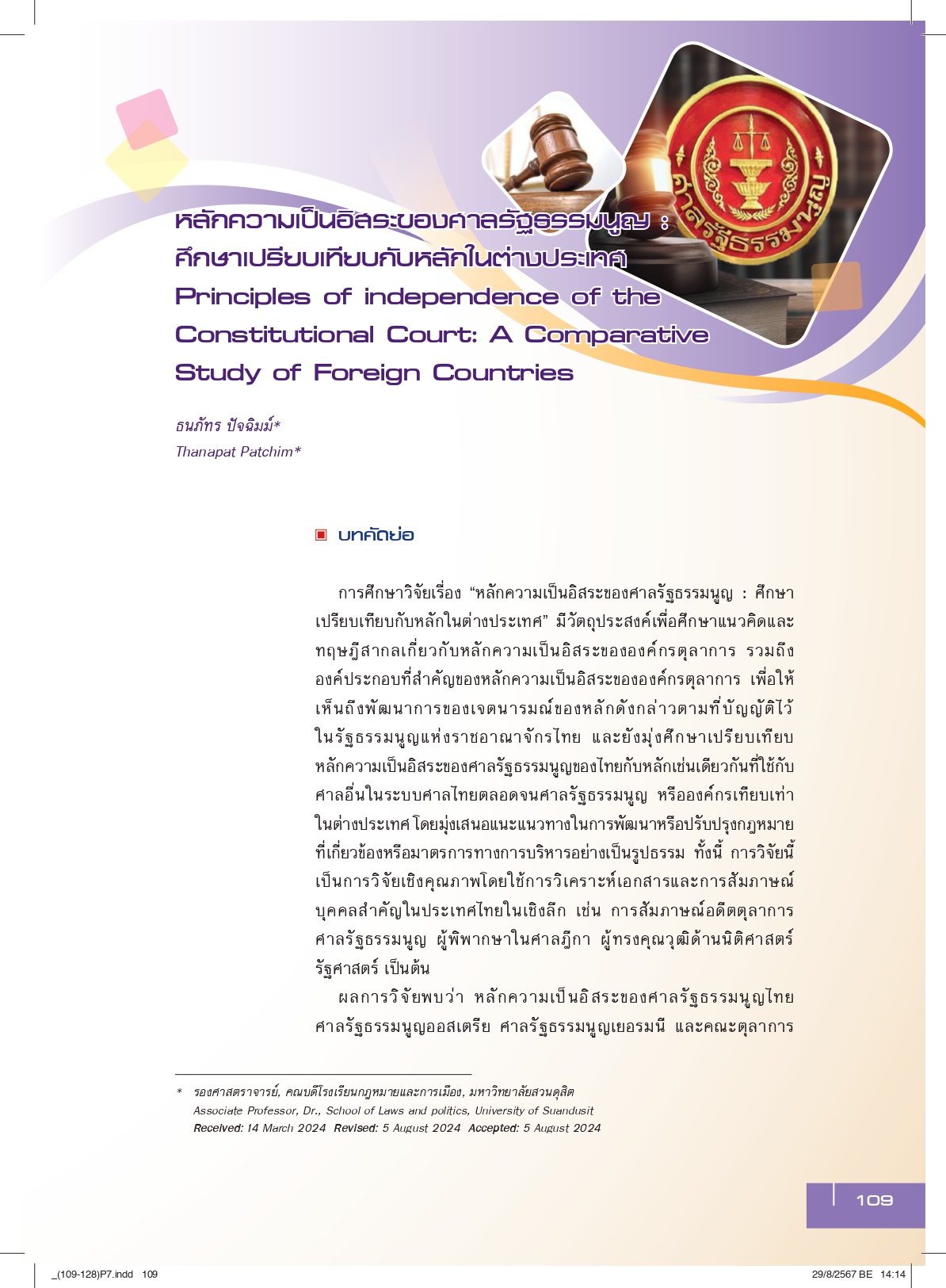หลักความเป็นอิสระของศาลรัฐธรรมนูญ : ศึกษาเปรียบเทียบกับหลักในต่างประเทศ
Main Article Content
บทคัดย่อ
การศึกษาวิจัยเรื่อง “หลักความเป็นอิสระของศาลรัฐธรรมนูญ : ศึกษาเปรียบเทียบกับหลัก ในต่างประเทศ” มีวัตถุประสงค์เพื่อศึกษาแนวคิดและทฤษฎีสากลเกี่ยวกับหลักความเป็นอิสระขององค์กรตุลาการ รวมถึงองค์ประกอบที่สำคัญของหลักความเป็นอิสระขององค์กรตุลาการ เพื่อให้เห็นถึงพัฒนาการของเจตนารมณ์ของหลักดังกล่าวตามที่บัญญัติไว้ในรัฐธรรมนูญแห่งราชอาณาจักรไทย และยังมุ่งศึกษาเปรียบเทียบหลักความเป็นอิสระของศาลรัฐธรรมนูญของไทยกับหลักเช่นเดียวกันที่ใช้กับศาลอื่นในระบบศาลไทยตลอดจนศาลรัฐธรรมนูญ หรือองค์กรเทียบเท่าในต่างประเทศ โดยมุ่งเสนอแนะแนวทางในการพัฒนาหรือปรับปรุงกฎหมายที่เกี่ยวข้องหรือมาตรการทางการบริหารอย่างเป็นรูปธรรม ทั้งนี้ การวิจัยนี้เป็นการวิจัยเชิงคุณภาพโดยใช้การวิเคราะห์เอกสาร
และการสัมภาษณ์บุคคลสำคัญในประเทศไทยในเชิงลึก เช่น การสัมภาษณ์อดีตตุลาการศาลรัฐธรรมนูญ ผู้พิพากษาในศาลฎีกา ผู้ทรงคุณวุฒิด้านนิติศาสตร์ รัฐศาสตร์ เป็นต้น
ผลการวิจัยพบว่า หลักความเป็นอิสระของศาลรัฐธรรมนูญไทย ศาลรัฐธรรมนูญออสเตรีย ศาลรัฐธรรมนูญเยอรมนี และคณะตุลาการรัฐธรรมนูญฝรั่งเศส มีหลักการแห่งความเป็นอิสระอย่างน้อย 2 ประการ ประการแรก คือความเป็นอิสระในทางเนื้อหา ทั้งนี้ ศาลรัฐธรรรมนูญต้องมีความเป็นอิสระด้านหน้าที่และอำนาจ โดยต้องเป็นอิสระจากทั้งฝ่ายนิติบัญญัติ ฝ่ายบริหารและฝ่ายตุลาการด้วยกันเอง และมีความอิสระด้านโครงสร้าง ตลอดจนด้านกระบวนการสรรหาและแต่งตั้งตุลาการ ประการที่สอง คือ ความเป็นอิสระในทางส่วนตัว ทั้งนี้ ศาลรัฐธรรมนูญต้องมีความเป็นอิสระในการดำรงตำแหน่ง การปฏิบัติหน้าที่ การถอดถอนและเปลี่ยนตุลาการ
การวิเคราะห์หลักความเป็นอิสระของศาลรัฐธรรมนูญของไทยและองค์กรทำนองเดียวกันของต่างประเทศนำมาสู่ข้อเสนอแนะในการปรับปรุงกฎหมายเพื่อให้หลักความเป็นอิสระของศาลรัฐธรรรมนูญไทยสอดคล้องกับมาตรฐานสากล ในการนี้ ควรแก้ไขกฎหมายในเรื่องคุณสมบัติของตุลาการศาลรัฐธรรมนูญเพื่อให้ตุลาการศาลรัฐธรรมนูญได้รับการสรรหาจากนักกฎหมายมหาชน นอกจากนี้ เพื่อหลีกเลี่ยงความสัมพันธ์ระหว่างบุคคล ควรทบทวนการจัดหลักสูตรอบรมต่าง ๆ โดยศาลรัฐธรรรมนูญ เพื่อมิให้กระทบต่อหลักความเป็นอิสระของศาลรัฐธรรมนูญ
Article Details

อนุญาตภายใต้เงื่อนไข Creative Commons Attribution-NonCommercial-NoDerivatives 4.0 International License.
ต้นฉบับที่ได้รับการตีพิมพ์ในวารสาร เป็นลิขสิทธิ์ของวารสารกระบวนการยุติธรรม แต่ความคิดเห็นที่ปรากฏในเนื้อหาของบทความในวารสารกระบวนการยุติธรรม ถือเป็นความรับผิดชอบของผู้เขียนแต่เพียงผู้เดียว
เอกสารอ้างอิง
NIDA Consulting Center. (2019). The Constitutional Court of the Kingdom of Thailand and foreign country. Active Print.
Office of the Constitutional Court. (2019). Research report on abuse of judicial authority: a comparative study of the Thai Constitutional Court and foreign country. Active Print.
Surasit Sangwirotchanaphat. (2022). Independence of judges: Experience from the Republic of Poland, chapter of the Bar Association Magazine.
The Constitution of the Kingdom of Thailand 2017. (2017, 6 April). Thai government gazette. No.134 Chapter 40 A. pp.1-90.
The Secretariat of The House of Representatives. (2019). Purpose and annotated sections of the Constitution of the Kingdom of Thailand 2017 (2560 B.E.). The secretariat of the house of representatives.
The Secretariat of The House of Representatives. (2020). Report of the Subcommittee in the Special Committee to Consider and Study Problems, Criteria, and Guidelines for Amendments to the Constitution of the Kingdom of Thailand 2017 (2560 B.E.). The house of representatives.
Vicki, C. J. (2012). Judicial independence: Structure, context, attitude. In Lydia Friederke Müller & others (Eds), Judicial I ndependence in Transition (pp. 19- 86). Heidelberg springer.
Zeitun, J. (2007). International principles on the independence and social responsibility of judges, lawyers and prosecutors: Guidelines for practitioners No. 1. International Commission of Jurists.


